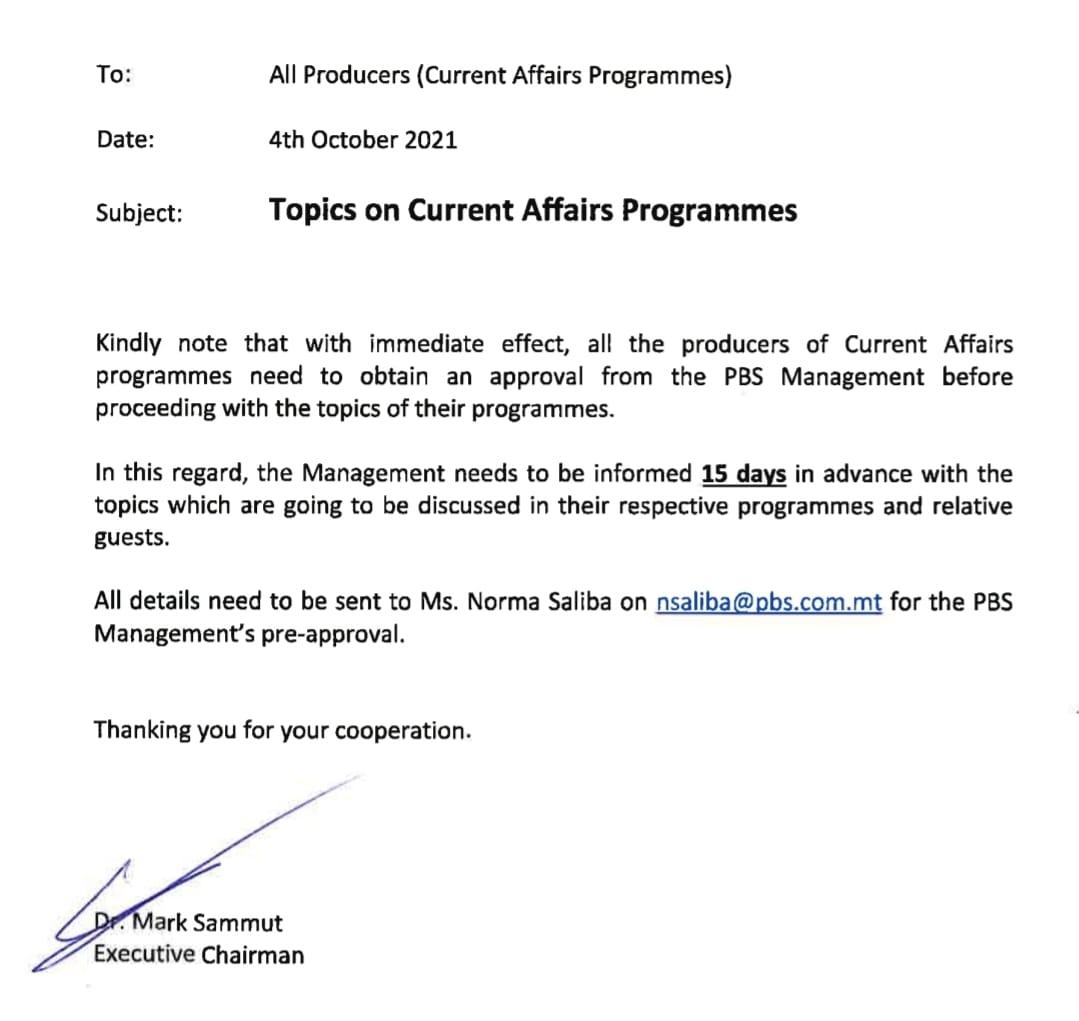Barely a week after the Center for Media, Data and Society classified PBS as State-controlled media, the national broadcaster went out of its way to quash any lingering doubts. All producers were instructed via memo, that they would have to seek management approval of the topics they intended to cover in any current affairs programmes, two weeks in advance of the broadcast.
Current affairs, approved two weeks in advance. Hilarious. And tragic. And, for those us around in the 1980s, ominously reminiscent of the bad old days, when the national broadcaster in the hands of thugs became a cheerleader for the disastrous, violence-driven Labour regime of the day.
As the economic prospects of the country, hamstrung and shredded by this Labour government’s own actions: corruption, criminality, the murder of a journalist, FATF greylisting, crucial industries such as financial services and igaming crumbling as a result, foreign banks refusing to do business with us, our international reputation destroyed…no-one is going to be allowed to discuss these catastrophic events on PBS stations without having first been granted permission by the powers that be.
This news, coming just before the fourth anniversary of the assassination of journalist Daphne Caruana Galizia, should feel to each of us like a stinging slap in the face.

The public inquiry into her brutal killing concluded that the State must bear responsibility for the hideous crime, for having created a culture of impunity for criminals, both within government and without, and actively fostered and orchestrated a climate of hatred against the journalist. This was further helped by the glaring lack of impartiality in the State broadcaster that was noted, and condemned, by the three judges conducting the inquiry.
As usual, the Labour government, having hung its head, wring its hands and vowed to implement all the recommendations contained with the inquiry report, has actually done nothing at all. Indeed, it’s doing the very opposite – at least in terms of national broadcasting.
Minister Carmelo Abela, accused by lowlife criminals of being an actual, real-life bank robber, warned us in July that the Labour Party was seeking to tighten its grip on the national broadcaster’s agenda.
His announcement in July that a new channel, TVM News+, would be created at the end of September, after which all news programmes would be shifted off the main channel and onto the secondary one, caused an uproar.
With just weeks to go before a new general election must be called, even if Abela doesn’t call the people to the polls early, as pundits have been expecting, the idea of shifting news and current affairs discussions away from the main channel seemed illogical and, even, sinister.
While TVM News+ does seem to have materialised, the threatened exile of news from the main channel doesn’t appear to have taken place. Yet. The online schedule, when it’s actually viewable, still includes regular slots for ‘L-Aħbarjiet’.
But there’s a sense of pieces being positioned, of strategic moves being made, in a puzzle that’s yet to reveal its full picture. And, for those of us with a memory longer than a goldfish’s, that picture promises to be menacing.
Any independent current affairs programme producers have long been axed from the national broadcaster’s screens. The appointment last year of Norma Saliba as head of news was a pretty unequivocal, open declaration of intent.
As the next election ticks nearer, a desperate government – mired in scandal, weighed down by sitting and former ministers and officials accused of some of the most serious crimes on the books, architects of wholescale ransack and pillage of the island’s resources through corruption, cronyism and outright fraud and theft, as well as being direct or indirect accomplices to the heinous murder of a journalist – can’t afford to lose power.
There are still large numbers of people in Malta who rely on television for their daily news updates. TVM is still, even in this internet age, crucial to many. It still plays an important role in the way information is disseminated and received by the population.
A few weeks ago The Shift reported that a PBS news item about disciplinary action taken against a water polo club official and known Labour activist was deleted shortly after it appeared, on the direct instruction of the office of the prime minister.
Step by step, one small move at a time, the Labour government’s capture of the State broadcaster as just another propaganda tool for itself, has become almost complete. Already, of course, news reports ignore some of the biggest stories being covered by the newspapers and online news portals because they show the government up as being corrupt or incompetent, or both.
The Opposition protests indignantly, but in this land of winner-takes-all, their protests are toothless and powerless. Proposals that look too obviously outrageous may be toned down occasionally, in theory, as the government does what it does best: paying lip service to ethical rules and public opinion. But in the end, even if it has to find a more tortuous way to achieve its aims, it simply carries on with its original plan anyway.
Commentary on social media against the government’s latest tactic to control the national narrative and tighten its grip on national broadcasting has likened the move to a North Korean style clampdown on free speech.
They’re not wrong. There was a time in the 1980s when Malta was North Korea’s only friend – bar China of course. They liked us so much, they even got a singing troupe to learn the words to what they probably imagined was our national anthem – the Labour mob’s paean to then prime minister Dom Mintoff – which they sang during a visit from the Maltese government to that nightmarish regime in 1984.
The Labour Party in government at the time certainly mimicked North Korean tactics: the total eradication of the Opposition from the airwaves, the national television and radio stations used as instruments by the thugs then in charge, to disseminate propaganda and demonise the Opposition.
The Malta Labour Party hasn’t changed since the 1980s. Some of the faces may be different, but the underlying criminality and willingness to use any and all methods to achieve their ends have not.
The Caruana Galizia public inquiry report made a point of highlighting the danger inherent in allowing the national broadcaster to operate with the kind of political bias and lack of impartiality that we’ve become used to over the past few years.
This latest move provides chilling confirmation that this Labour government has no intention of reforming the way it operates. There’s no doubt where this is all heading.













The departure of Joseph Muscat as a prime minister didn’t bring any change in government. The advisers that Muscat had are the same that Robert Abela has and their political strategy didn’t change one iota.
Leopards dont change their spots.
Can Norma Saliba give access to her Telegram and Whatsapp messages with OPM officials to the Broadcasting Authority?
The (People’s Democratic Socialist) Republic of Malta. You may now vote, citizen.